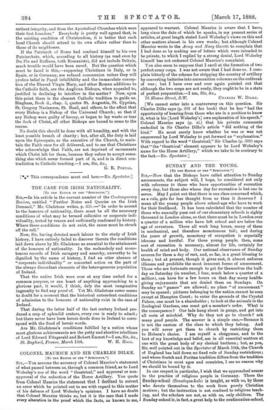SUNDAY AND THE YOUNG.
[To THE EDITOR OF THE "SPECTATOR."] Six,—Now that the Bishops have called attention to Sunday amusements, the subject will, I hope, be considered not only with reference to those who have opportunities of recreation every day, but those also whose day for recreation is but one in seven. May I point out that there is one class concerned which, as a rule, gets far less thought from us than it deserves ? I mean all the young people above school-age who have to work for their livelihood. It has been calculated that the number of those who annually pass out of our elementary schools is eighty thousand in London alone, so that there must be in London over a quarter of a million who have left school and are below the age of seventeen. These all work long hours, many of them in mechanical, and therefore monotonous toil ; and during the years of growth, monotony of occupation is especially irksome and hurtful. For these young people, then, some sort of recreation is necessary, almost for life, certainly for health of mind and body. Our national observance of Sunday secures for them a day of rest, and, so far, is a great blessing to them ; but at present, though it gives rest, it almost enforces idleness and prohibits the most innocent forms of amusement. Those who are fortunate enough to get for themselves the half- day on Saturday (in number, I fear, much below a quarter of a million), can have for a few hours on that day many health- giving enjoyments that are denied them on Sundays. On Sunday no " games " are allowed; no place "of amusement" may be opened; pictures belonging to the nation cannot be seen except at Hampton Court ; to enter the grounds of the Crystal Palace, one must be a shareholder ; to look at the animals in the Zoological Gardens, one must get a member's order. What is the consequence? Our lads hang about in gangs, and get into all sorts of mischief. Why do they not go to church ? ask many good people. The answer is a simple one,—Because it is not the custom of the class to which they belong. And you will never get them to church by restricting them to Hobson's choice. I am myself a clergyman, and to the best of my knowledge and belief, am in all essential matters at one with the great body of my clerical brethren ; but, as you, Sir, well pointed out in the Spectator of March 10th, the Church of England has laid down no fixed rule of Sunday restrictions ; and where Scotch and Puritan tradition differs from the tradition of Christians in most ages and countries, I see no reason why we should be bound by it.
In one respect in particular, I wish that we approached nearer to the practice of religious people in Germany. There the Sunday•school (Sonntagsschule) is taught, as with us, by those who devote themselves to the work from purely Christian motives ; but the instruction is not confined to religions teach- ing, and the scholars are not, as with us, only children. The Sunday-school is, in fact, a great help to the continuation-school,
and many young people not only get there a pleasant change from the vacuity of doing nothing, but they also find in their teachers friends who may be of great service to them intel- lectually, morally, and even spiritually. There is now in this country an excellent Association for forming "Recreative Evening Classes." Would not the scope of its usefulness be much enlarged if the classes were opened on Sunday after- noons as well But my object in writing to you is not to advocate any par- ticular plan, but to draw the thoughts of some of your readers to a kindred subject which is perhaps as well worth debating as the " Sunday amusements of the rich."—I am, Sir, &c.,



































 Previous page
Previous page